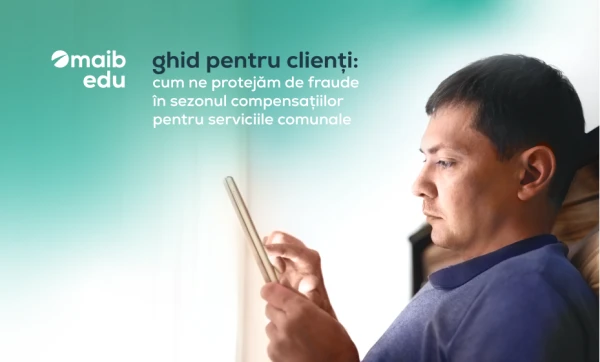The world of entrepreneurship can seem complex and full of unknowns, especially for those just starting. When starting a business, you’ll face many questions, decisions and responsibilities, from choosing the right idea and getting the necessary resources to managing relationships with partners and avoiding common mistakes. It’s natural to feel that every step is a challenge in the beginning.
Learning from others’ experience can be valuable in this journey. This article, written by the diez.md team, offers insights and answers to your most pressing questions, featuring the expertise of Traian Chivriga, a Moldovan entrepreneur with over ten years in the field.
Author’s note: the article is written in the first person. What you are about to read is a direct account from the interviewee.
I’m Traian Chivriga, 33 years old, and I’ve been an entrepreneur in Moldova since 2013, when I launched my first start-up, Vintage.
In this article, I’ll share a bit of my entrepreneurial journey, and if you’re considering starting your own business, I’ll offer some useful tips. You’ll learn that you don’t need to rent an office when you’re just starting, that mixing business with partying can be a mistake and that choosing a wrong partner can ruin your company.
Author’s note: Traian is the founder of the start-up and business accelerator XY Partners, which has helped over 340 businesses in Moldova grow through its acceleration programs since 2019. He is also a co-founder of Business Angels Moldova (BAM), which connects investors with start-ups. He recently become Sirius’s CEO and co-founder, a platform that helps companies manage their finances better.
First, think about a problem in your life that you’d like to solve. The solution to that problem will be your business idea.
Second, apply to a business accelerator or incubator. You’ll learn the basics and find your first customers.
And third, find a co-founder who enhances your skills and shares your vision.
Now, let’s dive into each point in more detail, starting with the first one. Once you’ve identified the problem you want to solve, you have two options:
1. go it alone (create the solution, research the market, and skip any mentoring/acceleration programs);
2. apply for a mentoring program.
I suggest seeking out someone who has already gone through what you’re about to experience. Sometimes, following a well-trodden path is a much better decision than venturing into uncharted territory.
You can join a business accelerator or approach another start-up founder and ask them to mentor you. You might even convince an angel investor to be your mentor.
Author’s note: Organizations like XY Partners, Dreamups, YEP Moldova, and Technovator offer various acceleration programs for businesses and start-ups.
For example, we work with around 50 start-ups and approximately 60 traditional businesses annually at XY. This means we incubate about 110 companies annually through our acceleration programs. Over four years, we’ve assisted 344 businesses. For context, around 1,000 new companies are established in Moldova each year. XY has incubated about 7-8% of all the new companies created in the country since 2019.
An accelerator doesn’t guarantee success, but it does increase your chances. Let me explain why.
1. When you join an acceleration program, you’re surrounded by many other entrepreneurs. You can learn something from them to implement in your business idea.
2. Accelerators connect you with numerous people, mentors and investors with whom you can network. In a three-month program, you could meet around 100 new people.
3. We offer a curriculum that teaches you how to register an LLC (SRL), create an MVP, launch it, draft contracts, and much more.
That said, I want to emphasize that people are different, and some manage well independently without needing mentoring or accelerators. It’s all very individual.
In this article, you’ll find a list of top 15 accelerators for start-ups and businesses at an international level.
Now, about co-founders, which I mentioned earlier as an important aspect when starting a business. From my own experience, when choosing a business partner, it’s crucial to have worked together previously. This is one of the first mistakes many make at the outset. If you don’t choose the right person, conflicts may arise that you won’t be able to manage, because, surprise, people are often different from how they appeared at first glance.
For instance, my first start-up, Vintage, which I launched in 2013, struggled for this very reason - we had conflicts with the co-founders.
The key is not to start a business with people you don’t know well. That’s why our programs always require a CTO, usually a programmer, and a CEO to handle sales. They create the perfect team. It’s fine to be friends with the co-founder you choose, but most importantly, your skills should complement each other.
Other mistakes to avoid at the beginning
1. When I launched my first start-up, I had some savings, so I rented an office. I shouldn’t have done that. I didn’t need an office at that stage, but, at that time, it felt necessary.
2. Another mistake I made was mixing business with having fun. We often threw parties together, and eventually, the idea that we were at work during working hours but friends after hours got blurred.
3. The next mistake was not budgeting my finances properly. Therefore, having a well-defined budget is essential.
4. Avoid focusing on unimportant aspects unrelated to product development or customer discussions. When starting a company, you need to focus on just two things:
1. creating the product;
2. talking to customers.
For example, if there’s a conference with no potential customers for you, it’s better not to attend. If an activity doesn’t involve finding customers or developing your product, it’s best to avoid it.
5. Only develop a simple product. Add features if necessary. For instance, Heal.md, a start-up mentored in the XY Accelerator VIII program, opted to create a concierge service for medical tourists instead of developing a marketplace for hospitals. A simple landing page is a great way to test the market initially.
6. Choosing the wrong partner can destroy your company. For example, most XY graduates failed due to conflicts or misunderstandings between co-founders, which I mentioned earlier.
There are many other mistakes related to sales, marketing, product, management, etc. I believe I’ve experienced almost every possible mistake. But now, I’m grateful because, thanks to that background, I know how to avoid repeating them.
When you’re just starting in entrepreneurship, you should take three essential steps. I’ll list them below – keep them in mind.
1. Test and validate your idea before investing significant resources. For example, Floral Soul tested the demand for office plants by sending offers via email before building a physical store and making the first import of plants.
To clarify, if you have a product, you should show it to customers (friends, acquaintances - anyone). This is the easiest and fastest way. You can even go to a café, like Tucano, approach someone, say you’re working on a start-up or have a product, and ask for their feedback.
2. Build a minimum viable product (MVP) that is functional, not perfect. For example, iASIG, which benefited from mentoring in the Entrepreneurship in Residence Program in Moldova organized by XY Partners, started with a simple product that sold only Green Card insurance. Over time, they launched RCA insurance, health insurance, road tax, and other useful services.
The MVP stage is also relevant for traditional businesses, not just start-ups. For instance, if you want to open a business selling pretzels, instead of investing 50,000 € in space and equipment, it’s better to make a few pretzels at home and give them to several people to try. This way, you’ll test whether people like them and if it’s worth starting such a business. This method works for practically any type of business.
To understand more clearly the difference between a start-up and a traditional business, read this article.
3. Collect feedback and iterate quickly to improve your product. For example, at Sirius, a bill management solution, we launch features that users request weekly.
Iteration – the continuous improvement of a product or service through small changes based on feedback until the optimal version is achieved.
At XY, we iterate in every program. The first edition took place in 2020, and now we are in our eighth edition in 2024, entirely different from the first one. This is due to the feedback we receive from the people we work with, which helps us improve.
In Moldova, there are several forms of legal organization, and one of them might perfectly suit your business idea.
If you’re wondering which one to choose, start with an LLC, the simplest and most flexible legal form. Even at XY, all graduate companies are registered as LLCs.
Author’s note: In Moldova, entrepreneurship can be practised as a natural person or a legal entity. If you want to start a business, you should consider the following forms of legal organization as a legal entity:
- general partnership;
- limited partnership;
- limited liability company (LLC);
- joint stock company;
- production cooperative;
- entrepreneurial cooperative
If you need external investment, you can set up a holding company in the USA, Estonia, or Romania to own the LLC. Many tech start-ups, like Unde.io, Floral Soul, or Pearl Code, have international structures to attract investors.
Later on, if necessary, the LLC can be transformed into a Joint Stock Company as the business grows.
Other legal forms are not bankable. It’s unlikely that you’ll be able to obtain a loan based on a patent. Generally, the LLC is a standard formula.
Furthermore, the new law regarding entrepreneurial activities is relatively permissive for LLCs:
Furthermore, the new law regarding entrepreneurial activities is relatively permissive for LLCs:
- you can have multiple co-founders;
- phantom stock allows valuable employees to legally receive a portion of dividends;
- you can easily register the company.
Author’s note: The Minister of Economic Development and Digitalization, Dumitru Alaiba, has explained what the phantom stock reform entails.
Phantom stock means that if a company or start-up has a valuable employee they don’t want to lose, the founders decide to motivate them by offering 10-15% of the annual profit. The founders give this money to the employees from the dividends they would typically receive. This was done before, but it wasn’t transparent. Cash would be withdrawn and given to the employee, making the process non-transparent. Now, that 10-15% is already taxed as dividends. Not many countries on the continent have such a system.
Dumitru Alaiba
Author’s note: LLC is the most common legal form in Moldova. A limited liability company can be established by one or more individuals or legal entities, and the number of associates cannot exceed 50. Its advantages include:
- you can hire personnel;
- it allows you to attract investments for business development;
- you can apply for grants and other funding programs.
As of May 2024, Moldova had approximately 209,000 registered enterprises, most of which (156,093) are limited liability companies (LLCs).
Last year, more companies were opened in Moldova than in 2022. We see an increase in the number of companies created in the country, indicating that starting a business in Moldova has become easier.
In terms of revenue, we currently have more start-ups, e-commerce businesses, and interesting companies with innovative models. I may be a bit subjective, but the quality is better now. Ultimately, we have a higher number of companies, and at the same time, the quality of services and products is higher.
More and more people want to engage in entrepreneurship now because they might be tired of working for someone else. Starting a company is now easier and less risky. More resources are available: grants, acceleration programs, business incubators, and co-working spaces - none of these were available in the past. We have a younger generation that no longer fits into the corporate environment.
Everyone is striving for freedom. When you create your own company, you are theoretically free. You’re free to do what you want, how you want, and for whom you want.





